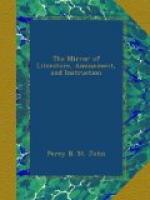In the time of the commonwealth, Brambletye was the focus of many a cavalier conspiracy. “From its not being a place of any strength or notice, it was imagined that Brambletye might better escape the keen and jealous watchfulness, which kept the protector’s eye ever fixed upon the strong holds and defensible mansions of the nobility and gentry; while its proximity to the metropolis, combined with the seclusion of its situation, adapted it to any enterprize which required at the same time secrecy, and an easy communication with the metropolis.”
In the novel just quoted, which is altogether a pleasant assemblage of historical facts, aided by the imaginative garniture of the author, the denouement is brought about by the explosion of a gunpowder vault which destroyed part of the mansion; and on the marriage of his hero and heroine Brambletye House was abandoned to its fate; “and the time that has intervened since its desertion,” says our author, “combining with the casualty and violence by which it was originally shattered and dismantled, has reduced it to its present condition of a desolate and forlorn ruin.”
A visit to Brambletye was the immediate object of our journey, and though a distance of thirty-three miles, we considered ourselves amply requited by the pensive interest of the scene and its crowded associations. In our childhood we had been accustomed to clamber its ruins and tottering staircases with delight, not to say triumph; heedless as we then were of the historical interest attached to them. After a lapse of a score and —— years, the whole scene had become doubly attractive. A new road had been formed from East Grinstead to Forest Row, from which a pleasant lane wound off to Brambletye. We are at a loss to describe our emotions as we approached the ruin. It was altogether a little struggle of human suffering. Within two hundred years the mansion had been erected, and by turns became the seat of baronial splendour and of civil feuds,—of the best and basest feelings of mankind;—the loyalty and hospitality of cavaliers; the fanatic outrages of Roundheads; and ultimately of wanton desolation! The gate through which Colonel Lilburne and his men entered, was blocked up with a hurdle; and the yard




